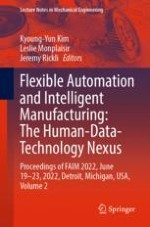2023 | OriginalPaper | Chapter
Modeling and Simulation to Assess the Role of Culture for Successful Lean Transformations
Authors : Amir Najarzadeh, Fazleena Badurdeen
Published in: Flexible Automation and Intelligent Manufacturing: The Human-Data-Technology Nexus
Publisher: Springer International Publishing
Activate our intelligent search to find suitable subject content or patents.
Select sections of text to find matching patents with Artificial Intelligence. powered by
Select sections of text to find additional relevant content using AI-assisted search. powered by
